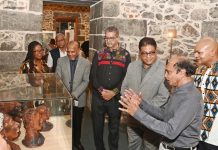Africa-Press – Mauritius. It is easy to see a rather peculiar confusion in the political imagination of a significant number of our fellow citizens. This confusion: that which assumes a natural link between the logic of the political party and what the sociologist Emmanuel Todd calls the system of families.
This confusion does not arise only from the sociology specific to the political terrain of Mauritius; it is entirely part of a very great power issue: that of opening up political space and equal and democratic access to the public sphere.
Thus, it is absolutely no coincidence that all political space today is occupied only by a few families and their relatives. This is the direct consequence of a rationality, of an anthropology itself, of our system – itself based on a very precise logic of the representation of Mauritian multiculturalism.
The universalist political thought of the Enlightenment, the conceptual and ideological base of modern democracy, imagined the logic and modus operandi of the party-form as a mimetic structure of the state-form; the political party must in a way be structured and organized like a small state, so that the conquest and the exercise of power take place as naturally as possible.
There is thus a certain continuation of the logic of the party in the logic of the state, and vice versa. However, in Mauritius we have a fairly similar practice, except that the party form is itself often reduced to family systems.
It is essential to understand the properly “systemic” dimension of these family systems, the notion of family here going far beyond the framework of the simple nuclear family.
We should rather understand the notion of family according to the understanding that ethnology can give it – following the studies of Claude Lévi-Strauss in particular -, that is to say as a system of kinship, filiation, lineage.
and alliances forming a social world whose different components are put in relation according to a family logic (by filiation and / or by alliances, via marriages or friendships).
These systems of lineage, filiation and alliances form an extremely complex and varied social machinery – these variations being, in general, dependent on the religious and / or cultural structures on which they are based.
For example, the political function of the caste system in Mauritius derives directly from these family systems and is based entirely on the logic of descent and alliance.
To come back to our problem, this simply means that political parties in Mauritius are organized like a family system, through strategies of alliance, descent and often kinship; where they should rather have organized and operated as associative systems whose object would be the greatest possible representativeness of the different social, economic, cultural and community components that make up the Mauritian Nation.
From this point of view, it is extremely interesting that a reader (who was kind enough to respond to an interview published in these same pages on May 3) defends the idea that the MSM and the PMSD are political parties that are part of a logic of the Labor Party and the MMM.
This reader’s argument was based on the simple fact that the family clans of the Jugnauth and Duval had heirs who already have or could take over the leadership of “their” party.
This point of view is not isolated: many people have fully internalized the fact that the sustainability of political parties is inseparable from the family system, inheritance and transmission from parents to children.
This point of view really testifies to an internalization – in the psychoanalytic sense of the term – of the mode of social reproduction of political power in Mauritius.
There is nothing surprising about this in reality, the discursivities and the political fabrications of the post-independence period having constantly hammered home a certain mythology of liberation, the objective of which was precisely to produce a link of symbolic causality between certain families and the fate of the Mauritian people.
As we all know, propaganda is a powerful tool and Maurice is of course no exception. Indeed, one of the most important issues of political modernization is the deconstruction of these discursivities, these myths and these fables. There is a whole political and ideological space there to invest.
Following Ranajit Guha, founding father of subordinate studies in India, it is easy to see that the role of the family system in our political system is one of the many debris of British colonial ideology, and the subject of ‘a political struggle of great importance if we wish to advance towards a freer, fairer, more meritocratic, more democratic, less communal and less corrupt system.
This fight must lead us towards reforms whose object will be an in-depth modernization of public life – which implies a modernization of the State and its institutions, but also a modernization of the political parties themselves, by emancipating them. of their family holdings in particular.
The primary stake of this renewal is to demonstrate that the link which may seem natural between the logic of political parties and the system of families is nothing other than a social and historical construction; and that as long as it is a social and historical construct, it can be politically modified, or even destroyed.
There is, of course, a real pragmatics on which these practices are based. The legal framework for political parties in Mauritius is far too vague and must be reviewed in order to make them truly democratic organizations and subject to specific guidelines and rules.
The question of electoral reform is one of the two sides of a problem, of which the reform of the party form constitutes the other side. Without a truly democratic reform of the methods of financing, organization, structuring and internal operation of political parties, we will remain in this logic of confusing family and private interests with political and public matters.
A political party cannot be an entity assimilated to the regime, even symbolic, of private property. It is not, literally, a family capital that can be passed from father to son, or from father to daughter.
There is here a dangerous diversion of the logic to which political apparatuses must be subjected in a healthy democracy, a diversion which produces a monopolization of the political sphere, of the public sphere, and which limits access to public affairs to people chosen by a political leader and / or belonging to the “right” family or the right community – “community” understood here in every sense of the word.
It is in this sense that political apparatuses become family systems, operating as a tributary patriarchy. This is an intolerable hindrance to democracy and a practice which is much more the domain of feudal societies than of a modern republic. However, it is entirely possible to remedy this situation through, once again, a framework for political parties.
It would suffice, for example, to create a Registrar of Political Parties, just as there is a Registrar of Associations, under the independent authority of the Election Commission or other regulatory body – which must also be independent and transparent.
But we all know very well why none of the current politicians will propose this reform: they will not get rid of the only means of access they have to power.
Let us have no illusions on this point. It is our political system, as it operates from the family system and nothing else, that secures the power of the political heirs.
It is not their leadership, their charisma, their aura, their vision, their project for our country, or even their intellectual skills! It is, often, not even their experience .
.
. The only claim they have to power is based, de facto, literally in the fact of having arisen.
Is this the right path for our country? Is this the way to make sure the best rule us? Is it really a system that is capable of producing social justice and the promotion of equal opportunities for all, something that a growing number of our fellow citizens legitimately dream of? Everyone will have their own opinion on these questions, but when we see through several independent studies – some coming from international institutions whose authority does not debate – that between 40% and 45% of Mauritians do not identify to any of the historic political parties, we feel more than ever that this system is at the end of its rope and that it is leading us straight into the wall.
However, from this observation, two possibilities arise. Can other political forces emerge by relying on organizations emancipated from the family system? Only the future will tell us.
What is certain, for the moment, is that we see real turmoil in this direction. The other, arguably the most pragmatic, possibility is a modernization of historic political parties – a modernization that would, among other things, tabula rasa family systems.
This is a real possibility, but it is conditioned by another question: what would take the place of the ideology of the family system within these parties? The quick answer, probably too quick, would be that the natural alternative would be a return of ideas within political parties.
To put it another way, and to be clearer, access to the leadership of a political party – if it no longer goes through the logic of inheritance and family transmission – must necessarily go through the debate of ideas and political projects.
This is nothing new, all the major parties in the great democracies of the world operating on this basis. This is, moreover, the function of the primaries in the United States and in France, as well as that of factions within the various parties in the British system.
For this conversion to take place in Mauritius, undoubtedly emerging from long internal party struggles, a party must already have three immovable foundations on which to rely:
(i) a progressive ideology capable of bringing together an undifferentiated set of the masses;
(ii) a History which goes beyond simple family genealogy;
(iii) a base and a foundation which occupy all the social, economic, community, cultural, identity and religious spheres which make up the Mauritian multiplicity – those which really make them national parties.
However, when we take a look at the chessboard, we can easily see that only two political parties combine these three ingredients: the Labor Party and the MMM.
This does not mean that the MSM and the PMSD do not have a History or a base, but the latter remain restricted, rather subscribing to a certain idea of economic (neo) liberalism allied to a family clan or a community. particular.
Of course, the PTr and the MMM have also been taken over by people who have based their power on the family system, but their history, their ideological aims and their capacities to bring together far exceed these people and these families.
As we are at a time when the party form itself is set to be rethought, these two political parties may well start a head start in the modernization race if they really want to.
The foundations are there, the structures are there, History is there and the legitimacy is there. They also have a youth that is not limited to sons and daughters, who question the old guard and who are already working for the metamorphosis of these devices. We can even guess that it is even only a matter of time before these young people enter the turn of disruption and modernization.







